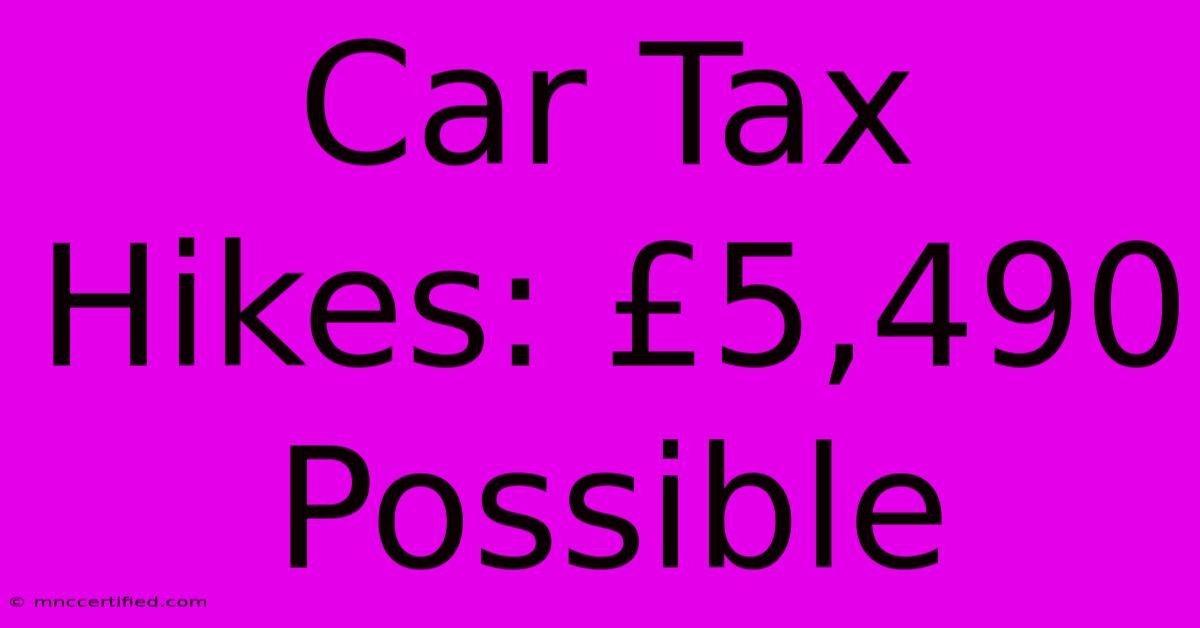Car Tax Hikes: £5,490 Possible

Table of Contents
Car Tax Hikes: A Potential £5,490 Shock to Drivers
The UK's car tax system is under scrutiny, with alarming projections suggesting potential hikes that could leave drivers facing a staggering £5,490 annual bill. This article delves into the factors contributing to this potential increase, explores the implications for motorists, and offers advice on navigating this challenging landscape.
Understanding the Current Car Tax System
Currently, Vehicle Excise Duty (VED), commonly known as car tax, is determined by a vehicle's CO2 emissions. Lower-emission vehicles attract lower tax rates, while higher-emission vehicles face significantly higher costs. The system aims to incentivize the purchase of greener, more environmentally friendly vehicles. However, the system's complexity and potential for significant increases are causing widespread concern.
The Looming £5,490 Car Tax Hike: Fact or Fiction?
The figure of £5,490 represents a worst-case scenario, extrapolated from potential future legislative changes and rising inflation. While not an immediate reality, it highlights the potential for dramatic increases in car tax, particularly for high-emission vehicles. This potential increase isn't a result of a single policy but rather a confluence of factors:
1. Inflationary Pressures:
The rising cost of living directly impacts government revenue and spending. To compensate for reduced purchasing power, tax increases across various sectors, including vehicle taxation, become more likely.
2. Environmental Targets:
The UK government has ambitious environmental targets, aiming to drastically reduce carbon emissions. Increasing car tax on high-emission vehicles could be a strategy to accelerate the transition to electric and hybrid vehicles. This aligns with wider efforts to improve air quality and combat climate change.
3. Funding for Infrastructure:
Investment in public transport and charging infrastructure for electric vehicles requires significant funding. Increased car tax revenue could potentially contribute to this essential infrastructure development.
Impact on Motorists: A Financial Burden?
A substantial increase in car tax would undoubtedly impact many drivers, particularly those relying on older, high-emission vehicles. This could lead to:
- Increased financial strain: Higher car tax bills could place additional pressure on household budgets, potentially forcing some motorists to make difficult choices about vehicle ownership.
- Reduced mobility: For some individuals, the increased cost of car ownership could restrict their ability to travel for work, education, or social activities.
- Accelerated shift to electric vehicles: The potential for higher car tax could incentivize a faster transition to electric vehicles, although affordability remains a barrier for many.
Mitigating the Impact: Strategies for Drivers
While the £5,490 figure remains a potential scenario, drivers can take proactive steps to minimize their exposure to significant tax increases:
- Consider fuel-efficient vehicles: When purchasing a new car, prioritize models with lower CO2 emissions to reduce your future tax liability.
- Explore alternative transport: Evaluate public transport, cycling, or carpooling options to reduce your reliance on a private vehicle.
- Monitor government announcements: Stay informed about proposed changes to the car tax system to anticipate potential increases and plan accordingly.
Conclusion: Preparing for the Future of Car Taxation
The potential for significant car tax hikes in the UK is a serious issue demanding careful consideration. While the £5,490 figure represents a potential extreme, the underlying factors point to a likely increase in car tax in the coming years. By understanding these factors and adopting proactive strategies, drivers can better prepare themselves for the changing landscape of vehicle taxation. The future of driving in the UK is undoubtedly linked to the future of car tax, and staying informed is crucial for every motorist.

Thank you for visiting our website wich cover about Car Tax Hikes: £5,490 Possible. We hope the information provided has been useful to you. Feel free to contact us if you have any questions or need further assistance. See you next time and dont miss to bookmark.
Featured Posts
-
Jiaozuo Taoding Trading Co Ltd
Nov 26, 2024
-
Flagship City Insurance Company
Nov 26, 2024
-
Thanksgiving Snow Winter Storm Impacts
Nov 26, 2024
-
What Is A Dl 123 Insurance Form
Nov 26, 2024
-
Lithuania Dhl Plane Crash Sabotage Suspected
Nov 26, 2024